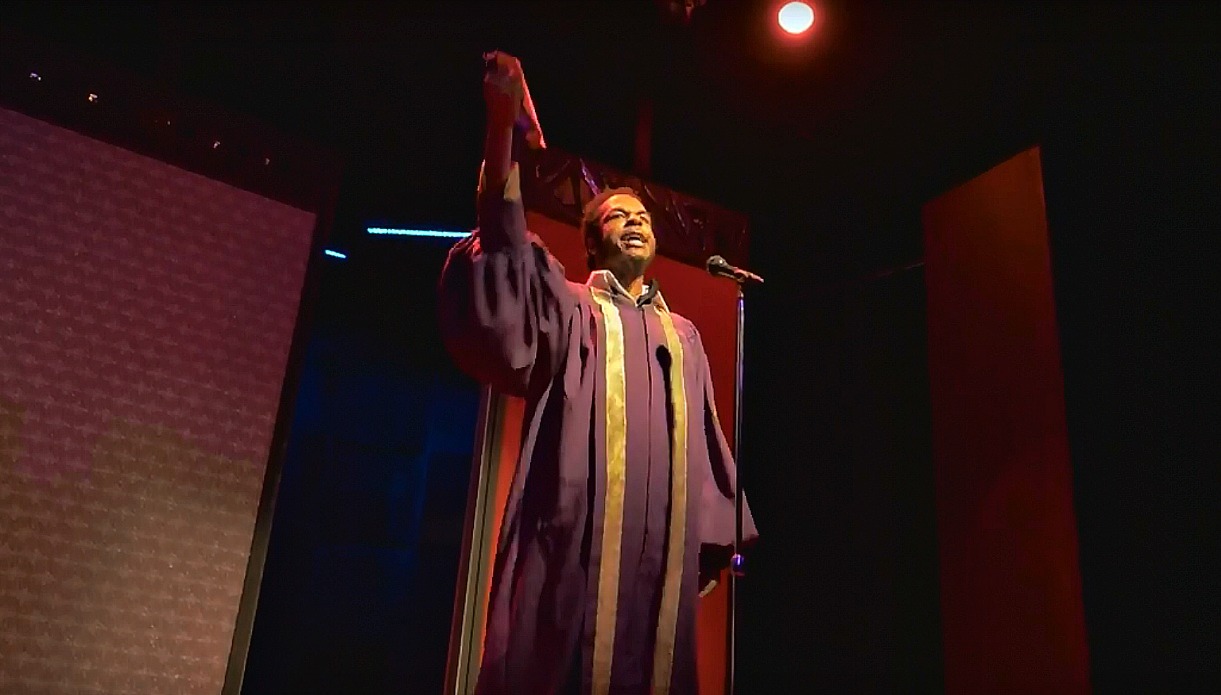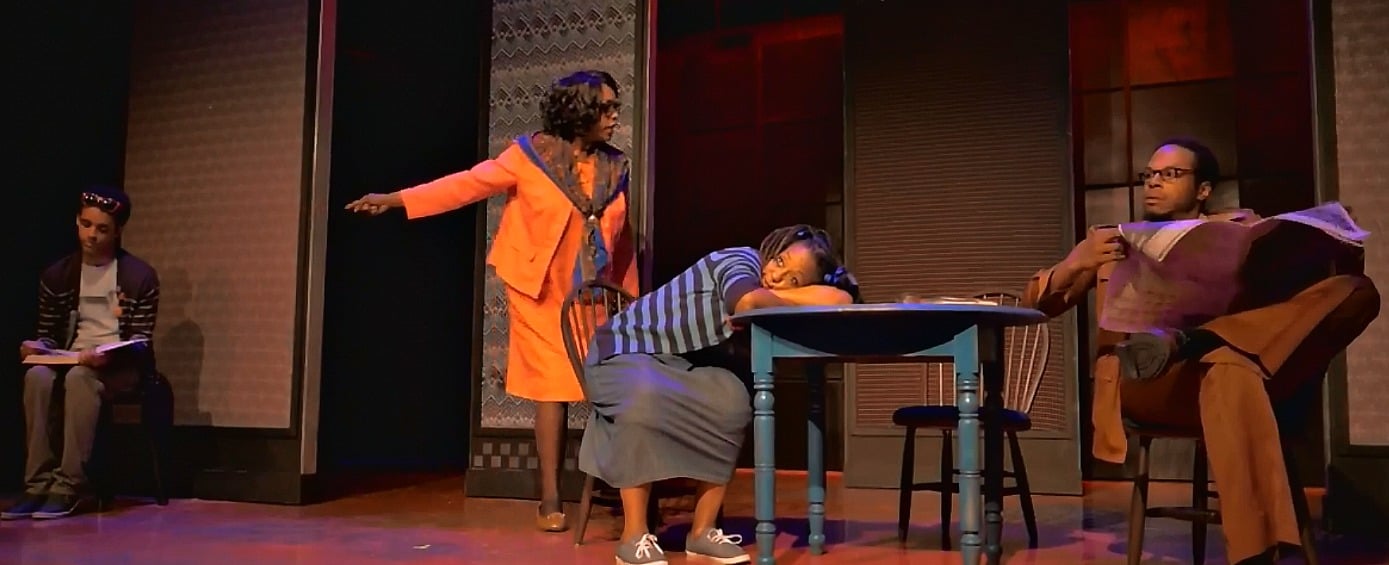Review: ‘Bootycandy’ – Wanna Be Starting Something New At Stage West?
ArtandSeek.net August 19, 2016 19‘Bootycandy’ is the title of an interconnected series of bawdy comic sketches about growing up black and gay. The play is outrageous and cutting. Local All Things Considered host BJ Austin asked Art & Seek’s Jerome Weeks about Stage West presenting the show’s area premiere — which he calls an unusual move.
So Jerome, why’s that unusual?
But without a doubt, ‘Bootycandy’ is the most sexually explicit one. It’s also a show that provocatively addresses the black gay experience — or at least parts of that experience, the wildly funny and even lurid parts.
Like what?

Djore Nance as the preacher in Stage West’s ‘Booty Candy.’
Meanwhile, Sutter’s parents recognize he has these questions and ‘mannerisms’ they’d really rather not talk about — they’d prefer to deny the whole situation. But when Sutter tells them a man’s been following him home from school and hugging him, his mother (Liz Mikel) and his stepfather (Djore Nance) leap into protective action.
This year, Mom declares, there’ll be NO musicals.
Son: But they’re doing ‘The Wiz.’
Mother: You’re not going to be in in no damned ‘Wiz.’
Son: I’ve already been cast as the Scarecrow.
Mother: I don’t care if you’ve been cast as the Scarecrow’s mama.
Stepfather: You need to STOP playing those Whitney Houston albums! And stop talking on the phone for three hours every night to Brandon about ‘Star Search’! And start mowing the lawn twice a week.
Mother: And wash my car.
Stepfather: And stop playing so much Uno.
Mother: And do the dishes without listening to that Culture Club!
Stepfather: And take them stickers of DeBarge, Madonna and Prince and the Jacksons off the side of your bunkbed.
Mother: And stop watching “Entertainment Tonight’!
That’s hysterical. It’s like something from the old TV show, ‘In Living Color.’
Yet ‘Bootycandy’ also has its extremely somber moments. As he matures, Sutter may have nothing in common with his relatives and have no rewarding connection to any institution or outside authority. But perhaps he can at least connect to a fellow gay male. Instead, he has a long and unhappy affair with a married white man, played by Justin Duncan.
Aaron Green: Please
Justin Duncan: OK
Green: Don’t call anymore
Duncan: OK
Green: Don’t write anymore
Duncan: OK
Green: You’re straight.
Duncan: I know.
Green: Stay that way.
Duncan: You tried once – a girl
Green: Once.
Duncan: Who?
Green: Once.
Duncan: Who?
Green: Tamara
Duncan: Green?
Green: Green. Once.
Duncan: And?
Green: Awful.
Duncan: I want to be your friend, just friends
Green: Don’t call anymore. Don’t write anymore. … They need you.

Aaron Green, Liz Mikel, Natalie King and Djore Nance in Stage West’s ‘Bootycandy.’
So all this holds together?
This writers’ conference edges ‘Bootycandy’ away from the genre of ‘semi-autobiographical gay comedy’ into the highly self-conscious, cultural satire of George C. Wolfe’s ‘The Colored Museum.’ (Wolfe, in fact, was an early mentor of O’Hara’s.) But after O’Hara gets his quick shots in at reviewers, other black writers and clueless white academics, he immediately drops the whole effort. In the end, it’s funny, but it’s mostly a distraction.
What’s much more troublesome are the last few scenes. Sutter, previously sympathetic, becomes increasingly cold-hearted until he can simply shrug off the death of another man. O’Hara says, this is the what happens with ignorance and homophobia, the wholesale misunderstandings across race and generations and gender identity. Bravo — show us the (comic) damage, the wounds. But then the show makes a last-second pivot into exultation that seems pretty unearned. Director Akin Babatunde has done a terrific job keeping ‘Bootycandy’ on the rails, moving fast and funny. And he’s got a crackerjack cast, not just Nance — the play is a showcase for his over-the-top talents — but also Green, Duncan, Mikel and Natalie Wilson King (both of whom are featured in a riotous reversal of a lesbian wedding ceremony).
But not even they can make emotional sense of the ending.
There’s one welcome scene toward the end, though. That’s when Sutter visits his grandmother (Djore Nance) in her retirement home. It’s welcome because — even in drag, even with granny being an outright hustler after money and short ribs for lunch — it’s the closest thing we ever see to quiet, conventional family life. It’s not a tragic hook-up or a comic howlfest, which have been the only two modes black gay life seems to operate on throughout most of ‘Bootycandy.’ (O’Hara has credited his grandmother with helping raise him.) Thanks to Nance, it’s still wickedly funny, but his granny is also real, and the scene is about the only time Aaron Green gets to be calm and kind as Sutter.
At heart, O’Hara is a satirist, so yes, his responsibility is to the knife, not the bandage. But the format of ‘Bootycandy’ is essentially biographical — we get a young black gay man’s life. And to be credible, that life can’t be all pathology and penis jokes.
At the start, you called this a risk for Stage West? Why?
The risk in all this, of course, lies in alienating Stage West’s older subscribers. Obviously, the long-term results won’t be in until next season. One play rarely makes or breaks a long-established theater company. But Saturday’s opening night audience for ‘Bootycandy’ was one of the most enthusiastic I’ve seen at Stage West and at Sunday’s matinee, the theater started its new project of holding post-show discussions. A surprising number of grey-hairs stayed. They didn’t just not walk out at intermission, they stuck around. They wanted to talk about this wild new play.
They seemed to take to it – like candy.
A Stage West interview with director Akin Babatunde:










